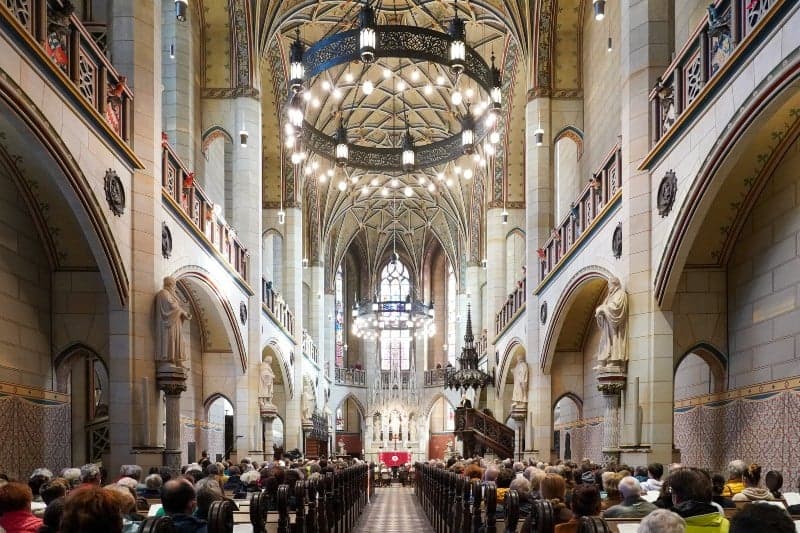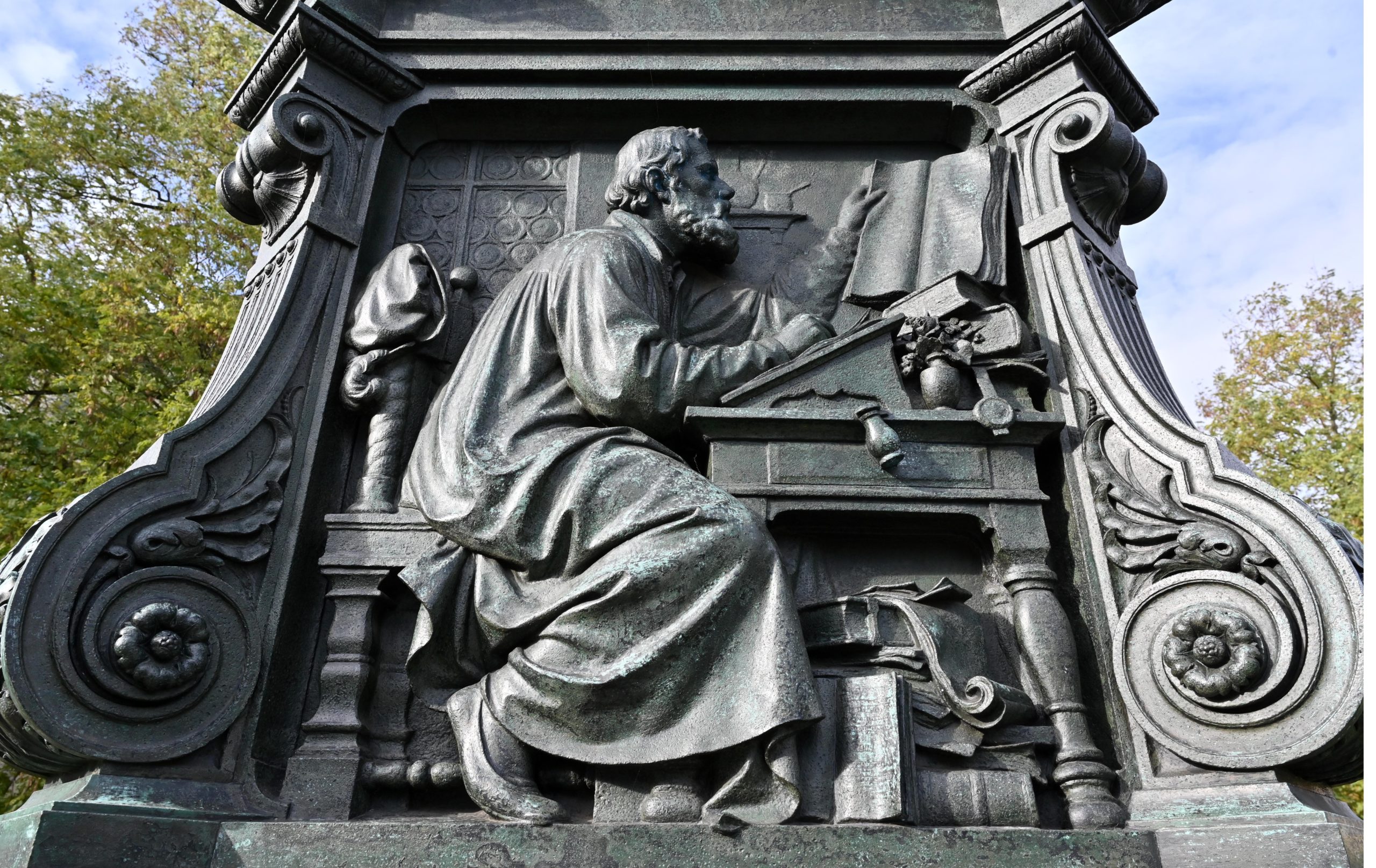What is Germany's Reformation Day and where is it a public holiday?

When you think of October 31st, you may automatically think of spooky costumes and Halloween parties - but for many in Germany this date has a rather different connotation.
On October 31st every year, more than half of all German states give their residents a day off - and it's not so they can prepare the perfect costume for Halloween.
Instead, nine of Germany's 16 states hold a public holiday to celebrate a special date in the protestant calendar known as Reformation Day.
The public holiday commemorates the German scholar and reformist Martin Luther and his role in setting in motion the birth of Protestantism in Europe - otherwise known as the Reformation.
Interestingly enough, it also falls just ahead of the Catholic public holiday of All Saint's Day, making it a rare week in Germany when both the protestant and catholic states their own days off in quick succession.
READ ALSO: Why all German states except Berlin and Hesse have a holiday next week
Why October 31st?
Though historians have differing views on the significance of this date, October 31st is believed to be the date on which Martin Luther famously nailed his 95 theses to the door of the All Saint's Church in Wittenberg back in 1517.
Fellow Lutheran reformer Philip Melanchthon - a contemporary of and collaborator with Luther - names this date in his accounts, although these have never been verified.
One thing we do know is that Luther sent his theses to Albert of Brandenburg, the Archbishop of Mainz, on this date.

A statue in Eisenach, Thuringia pays tribute to Martin Luther. Photo: picture alliance/dpa/dpa-Zentralbild | Martin Schutt
His blistering critique of the Catholic Church ultimately led to a split in the former alliance of Church and State in Western Europe, dividing regions that supported Catholicism and the Pope from those that developed various kinds of Protestantism.
Historians believe that Luther may have chosen the date of October 31st - All Hallow's Eve - as a way of garnering the attention of the common folk.
Why did Martin Luther criticise the Catholic Church?
Though Luther's campaign against the Catholic establishment had far-reaching consequences, he never actually wanted to destroy or replace Catholicism, but simply reform it.
His primary target was what he saw as the rampant corruption and greed within the Church: by the 16th Century, religious figures had been increasingly mixed up with the politics and power struggles of the Holy Roman Empire and, in Luther's view, increasingly divorced from the tenets of biblical scripture.
He particularly despised the common practice of selling indulgences to absolve people of their sins.
This effectively meant that sinners could simply use their money in exchange for a candlelit prayer that was believed to let them off the hook. These pardons were essentially religious 'get out of jail free cards' and the more money people paid for them, supposedly the more years were taken off their time in purgatory.
Famously, Luther told an assembly of Holy Roman Empire grandees in Worms that he would only retract his criticisms of the church if he was shown scriptures that supported these new practices.
He reportedly infuriated the Catholic Church so much that he had to be 'kidnapped' and taken into hiding for his own safety. In fact, he ended up in Eisenach, where in just 11 weeks he translated the whole of the New Testament from Greek into German.
READ ALSO: 12 things you didn't know about Martin Luther
Where is Reformation Day celebrated?
Given its important role in protestant heritage, Reformation Day is observed by protestant communities all over the world - but, as you might expect, particularly in the Lutheran church.
In Germany, October 31st is a public holiday in the vast majority of protestant states.
These include the former East German states Brandenburg, Mecklenburg-Western Pomerania, Saxony, Saxony-Anhalt and Thuringia - and, since 2018, the northern German states of Lower Saxony, Bremen, Hamburg, and Schleswig-Holstein.
In the town of Eisenach in Lower Saxony, there's even a medieval market held on the weekend on of after the 31st. This charming little gathering has been held in the town since 1520, and these days is held in hour of Eisenach's most famous resident: Martin Luther himself.
Unfortunately for those in the capital, Berlin is the only part of the former East not to have a public holiday at the end of October.
Somewhat surprisingly, Reformation Day is also a public holiday in the primarily catholic country of Slovenia, and, with the expanding influence of the evangelical faith in Latin America, it became a holiday in both Peru and Chile relatively recently. In Chile, however, it is celebrated on October 27th.
Comments
See Also
On October 31st every year, more than half of all German states give their residents a day off - and it's not so they can prepare the perfect costume for Halloween.
Instead, nine of Germany's 16 states hold a public holiday to celebrate a special date in the protestant calendar known as Reformation Day.
The public holiday commemorates the German scholar and reformist Martin Luther and his role in setting in motion the birth of Protestantism in Europe - otherwise known as the Reformation.
Interestingly enough, it also falls just ahead of the Catholic public holiday of All Saint's Day, making it a rare week in Germany when both the protestant and catholic states their own days off in quick succession.
READ ALSO: Why all German states except Berlin and Hesse have a holiday next week
Why October 31st?
Though historians have differing views on the significance of this date, October 31st is believed to be the date on which Martin Luther famously nailed his 95 theses to the door of the All Saint's Church in Wittenberg back in 1517.
Fellow Lutheran reformer Philip Melanchthon - a contemporary of and collaborator with Luther - names this date in his accounts, although these have never been verified.
One thing we do know is that Luther sent his theses to Albert of Brandenburg, the Archbishop of Mainz, on this date.

His blistering critique of the Catholic Church ultimately led to a split in the former alliance of Church and State in Western Europe, dividing regions that supported Catholicism and the Pope from those that developed various kinds of Protestantism.
Historians believe that Luther may have chosen the date of October 31st - All Hallow's Eve - as a way of garnering the attention of the common folk.
Why did Martin Luther criticise the Catholic Church?
Though Luther's campaign against the Catholic establishment had far-reaching consequences, he never actually wanted to destroy or replace Catholicism, but simply reform it.
His primary target was what he saw as the rampant corruption and greed within the Church: by the 16th Century, religious figures had been increasingly mixed up with the politics and power struggles of the Holy Roman Empire and, in Luther's view, increasingly divorced from the tenets of biblical scripture.
He particularly despised the common practice of selling indulgences to absolve people of their sins.
This effectively meant that sinners could simply use their money in exchange for a candlelit prayer that was believed to let them off the hook. These pardons were essentially religious 'get out of jail free cards' and the more money people paid for them, supposedly the more years were taken off their time in purgatory.
Famously, Luther told an assembly of Holy Roman Empire grandees in Worms that he would only retract his criticisms of the church if he was shown scriptures that supported these new practices.
He reportedly infuriated the Catholic Church so much that he had to be 'kidnapped' and taken into hiding for his own safety. In fact, he ended up in Eisenach, where in just 11 weeks he translated the whole of the New Testament from Greek into German.
READ ALSO: 12 things you didn't know about Martin Luther
Where is Reformation Day celebrated?
Given its important role in protestant heritage, Reformation Day is observed by protestant communities all over the world - but, as you might expect, particularly in the Lutheran church.
In Germany, October 31st is a public holiday in the vast majority of protestant states.
These include the former East German states Brandenburg, Mecklenburg-Western Pomerania, Saxony, Saxony-Anhalt and Thuringia - and, since 2018, the northern German states of Lower Saxony, Bremen, Hamburg, and Schleswig-Holstein.
In the town of Eisenach in Lower Saxony, there's even a medieval market held on the weekend on of after the 31st. This charming little gathering has been held in the town since 1520, and these days is held in hour of Eisenach's most famous resident: Martin Luther himself.
Unfortunately for those in the capital, Berlin is the only part of the former East not to have a public holiday at the end of October.
Somewhat surprisingly, Reformation Day is also a public holiday in the primarily catholic country of Slovenia, and, with the expanding influence of the evangelical faith in Latin America, it became a holiday in both Peru and Chile relatively recently. In Chile, however, it is celebrated on October 27th.
Join the conversation in our comments section below. Share your own views and experience and if you have a question or suggestion for our journalists then email us at [email protected].
Please keep comments civil, constructive and on topic – and make sure to read our terms of use before getting involved.
Please log in here to leave a comment.